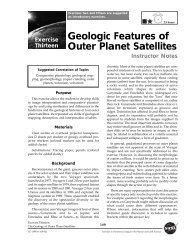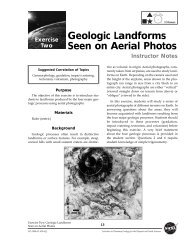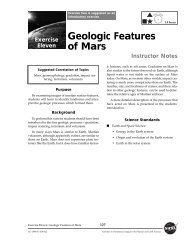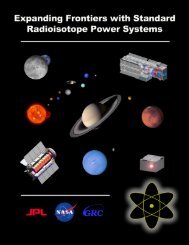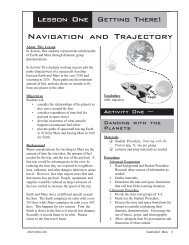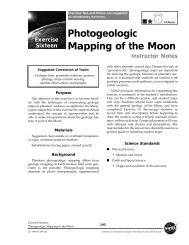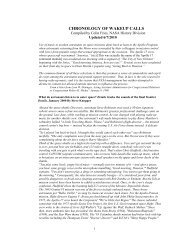Vision and Voyages for Planetary Science in the - Solar System ...
Vision and Voyages for Planetary Science in the - Solar System ...
Vision and Voyages for Planetary Science in the - Solar System ...
You also want an ePaper? Increase the reach of your titles
YUMPU automatically turns print PDFs into web optimized ePapers that Google loves.
important advances are often <strong>the</strong> result of analyses carried out us<strong>in</strong>g data archives supported by <strong>the</strong><br />
SRA program years or even decades after a mission has ended.<br />
The <strong>Planetary</strong> Data <strong>System</strong> (PDS) provides <strong>the</strong> critical data archiv<strong>in</strong>g <strong>and</strong> distribution<br />
function to <strong>the</strong> planetary science community. Over <strong>the</strong> last 20 years, <strong>the</strong> PDS has established a<br />
systematic protocol <strong>for</strong> archiv<strong>in</strong>g <strong>and</strong> distribut<strong>in</strong>g mission data that has become <strong>the</strong> <strong>in</strong>ternational<br />
st<strong>and</strong>ard. It is crucial that <strong>the</strong> capabilities of <strong>the</strong> <strong>Planetary</strong> Data <strong>System</strong> be ma<strong>in</strong>ta<strong>in</strong>ed by<br />
NASA, both to provide a permanent archive of planetary data <strong>and</strong> to provide a means of<br />
distribut<strong>in</strong>g those data to <strong>the</strong> world at large. It is also essential that newly acquired data cont<strong>in</strong>ue<br />
to be archived <strong>and</strong> made accessible to <strong>the</strong> science community with<strong>in</strong> no more than 6 months<br />
follow<strong>in</strong>g receipt <strong>and</strong> validation. For data from ground-based or <strong>in</strong>ternational partner <strong>in</strong>struments,<br />
contractual agreements should be used to assure <strong>the</strong> timely delivery of such data to <strong>the</strong> PDS<br />
(sometimes with<strong>in</strong> fund<strong>in</strong>g agreements from specific support<strong>in</strong>g research <strong>and</strong> analysis programs).<br />
The PDS should also consider develop<strong>in</strong>g requirements <strong>for</strong> data archiv<strong>in</strong>g by small groups who have<br />
implemented creative data process<strong>in</strong>g that enhances <strong>the</strong> value of exist<strong>in</strong>g planetary data sets.<br />
High-level data products must be archived along with <strong>the</strong> low-level products typically<br />
produced by <strong>in</strong>strument teams. For future missions, Announcements of Opportunity (AOs)<br />
should m<strong>and</strong>ate that <strong>in</strong>strument teams propose <strong>and</strong> be funded to generate derived products<br />
be<strong>for</strong>e missions have completed Phase E. In <strong>the</strong> <strong>in</strong>terim, separate support should be provided <strong>for</strong><br />
development of high-level data products <strong>in</strong> cases where such support cannot be provided by mission<br />
fund<strong>in</strong>g.<br />
Use of <strong>the</strong> appropriate st<strong>and</strong>ards is essential to enable synergistic application of planetary<br />
data sets. Over <strong>the</strong> past two decades <strong>the</strong> development of <strong>the</strong> Navigation <strong>and</strong> Ancillary In<strong>for</strong>mation<br />
Facility (NAIF) at JPL, toge<strong>the</strong>r with <strong>the</strong> evolv<strong>in</strong>g st<strong>and</strong>ards associated with SPICE kernels—i.e.,<br />
specific data files conta<strong>in</strong><strong>in</strong>g ancillary <strong>in</strong><strong>for</strong>mation relat<strong>in</strong>g to <strong>the</strong> orientation, location, operat<strong>in</strong>g<br />
mode, <strong>and</strong> o<strong>the</strong>r operat<strong>in</strong>g characteristics relevant to how data from a particular spacecraft <strong>in</strong>strument<br />
was collected—have greatly streaml<strong>in</strong>ed <strong>and</strong> st<strong>and</strong>ardized plann<strong>in</strong>g, acquir<strong>in</strong>g, <strong>and</strong> archiv<strong>in</strong>g<br />
<strong>in</strong><strong>for</strong>mation about observations. The NAIF facility <strong>and</strong> SPICE kernels should cont<strong>in</strong>ue to be used,<br />
<strong>and</strong> NASA planetary missions should adopt SPICE as a st<strong>and</strong>ard dur<strong>in</strong>g mission plann<strong>in</strong>g, operations,<br />
<strong>and</strong> archiv<strong>in</strong>g. Development of st<strong>and</strong>ards <strong>for</strong> geodetic <strong>and</strong> cartographic coord<strong>in</strong>ate systems should to<br />
be encouraged, <strong>and</strong> <strong>the</strong>se systems should be documented <strong>and</strong> archived with<strong>in</strong> a NAIF/SPICE<br />
framework.<br />
With expected large <strong>in</strong>creases <strong>in</strong> data volume dur<strong>in</strong>g <strong>the</strong> next 10 years, PDS capabilities will<br />
have to exp<strong>and</strong>. The exist<strong>in</strong>g PDS is very much a product of its orig<strong>in</strong>al decade of creation. The<br />
planned PDS upgrade will better leverage modern databases <strong>and</strong> web services, creat<strong>in</strong>g an on-l<strong>in</strong>e<br />
resource that will serve <strong>the</strong> more complex needs of modern science user communities. New types of<br />
data, like pert<strong>in</strong>ent laboratory measurements <strong>and</strong> telescopic data, could be added where appropriate.<br />
Periodic reviews, as already per<strong>for</strong>med, will ensure that <strong>the</strong> science communities’ needs are met. A<br />
balanced SRA program will allow <strong>for</strong> fur<strong>the</strong>r development of related public doma<strong>in</strong> software, such as<br />
OLAF (<strong>for</strong> data <strong>in</strong>gestion) <strong>and</strong> ISIS (image manipulation <strong>and</strong> mosaick<strong>in</strong>g), <strong>and</strong> a coord<strong>in</strong>ated set of<br />
st<strong>and</strong>ards (geodetic, cartographic maps, <strong>and</strong> o<strong>the</strong>r systems). And, as planetary exploration cont<strong>in</strong>ues<br />
to become a more <strong>in</strong>ternational enterprise, it will be <strong>in</strong>creas<strong>in</strong>gly important <strong>for</strong> NASA to assure<br />
<strong>in</strong>teroperability of <strong>the</strong> PDS with o<strong>the</strong>r <strong>in</strong>ternational repositories of planetary data.<br />
Communicat<strong>in</strong>g With <strong>the</strong> Public: Education <strong>and</strong> Outreach<br />
The tremendous public <strong>in</strong>terest <strong>in</strong> planets <strong>and</strong> planetary exploration po<strong>in</strong>ts to a deeply rooted<br />
resonance between <strong>the</strong> work done by planetary scientists <strong>and</strong> <strong>the</strong> broader populace. In its most gr<strong>and</strong><br />
sense, planetary exploration challenges us all to be curious about <strong>the</strong> world <strong>in</strong> which we live. Such<br />
curiosity can lead to a greater appreciation of <strong>the</strong> role of that science <strong>in</strong> general <strong>and</strong> planetary science<br />
<strong>in</strong> particular can play <strong>in</strong> foster<strong>in</strong>g a vigorous <strong>and</strong> economically healthy nation.<br />
PREPUBLICATION COPY—SUBJECT TO FURTHER EDITORIAL CORRECTION<br />
10-6



